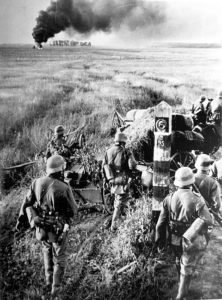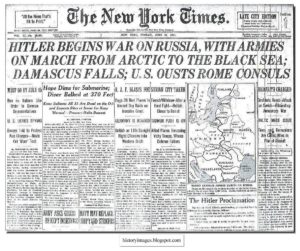1941
Operation Barbarossa
Invading the Russian heartland from the west seems to be a bad idea. The Teutonic Knights tried it and lost the Battle of the Ice in 1242; the Swedes tried it and were thrashed at Poltava in 1709; Napoleon tried it and never recovered from the retreat from Moscow in 1812; and Hitler tried it in 1941 with Operation Barbarossa, the largest military action in world history. The result: close but no cigar.
Adolf Hitler’s political testament My Struggle, written in the 1920s, made his intentions clear. The future of Germany lay in expanding into eastern Europe, cleansing it of its Slavic population, and making living space for a racially-pure Aryan race. We completely break our past colonial and trade policy and deliberately turn to acquiring new lands in Europe. We can only consider Russia and its neighboring countries. After Hitler’s election in 1933, the relations between Germany and the USSR were hostile; the Spanish Civil War was a proxy conflict with both nations pouring arms and men into the opposing sides. Stalin watched in alarm as Hitler swallowed up Austria and Czechoslovakia and turned his eyes on Poland but could not bring himself to ally with other German foes such as Britain and France.
The world was astonished, therefore, to learn that in August 1939, these antagonists had signed the Molotov-Ribbentrop Pact, which set out a 10-year peace treaty (and which, in secret clauses, vowed cooperation in an invasion of Poland). Scarcely more than a week later, Germany invaded Poland and soon after, Soviet forces occupied the east of the country and would go on to extinguish the independence of Latvia, Lithuania, and Estonia.
The German Reich and the Soviet Union now shared a long common border. No one expected their peace to last the full 10 years but, despite numerous warnings from spies and western powers, Stalin was taken by surprise when, less than two years after the pact, millions of German troops swarmed into the Soviet Union in Operation Barbarossa, named for a medieval Holy Roman Emperor. Joined with allies from Finland, Slovakia, Italy, Hungary and Romania, German divisions pressed deep into the USSR, taking millions of Red Army soldiers prisoner. But despite overrunning vast Russian territory and sweeping aside a number of armies, the German did not achieve their goals: the front stalled in front of Leningrad and Moscow as winter set in. A desperate gamble had failed.

